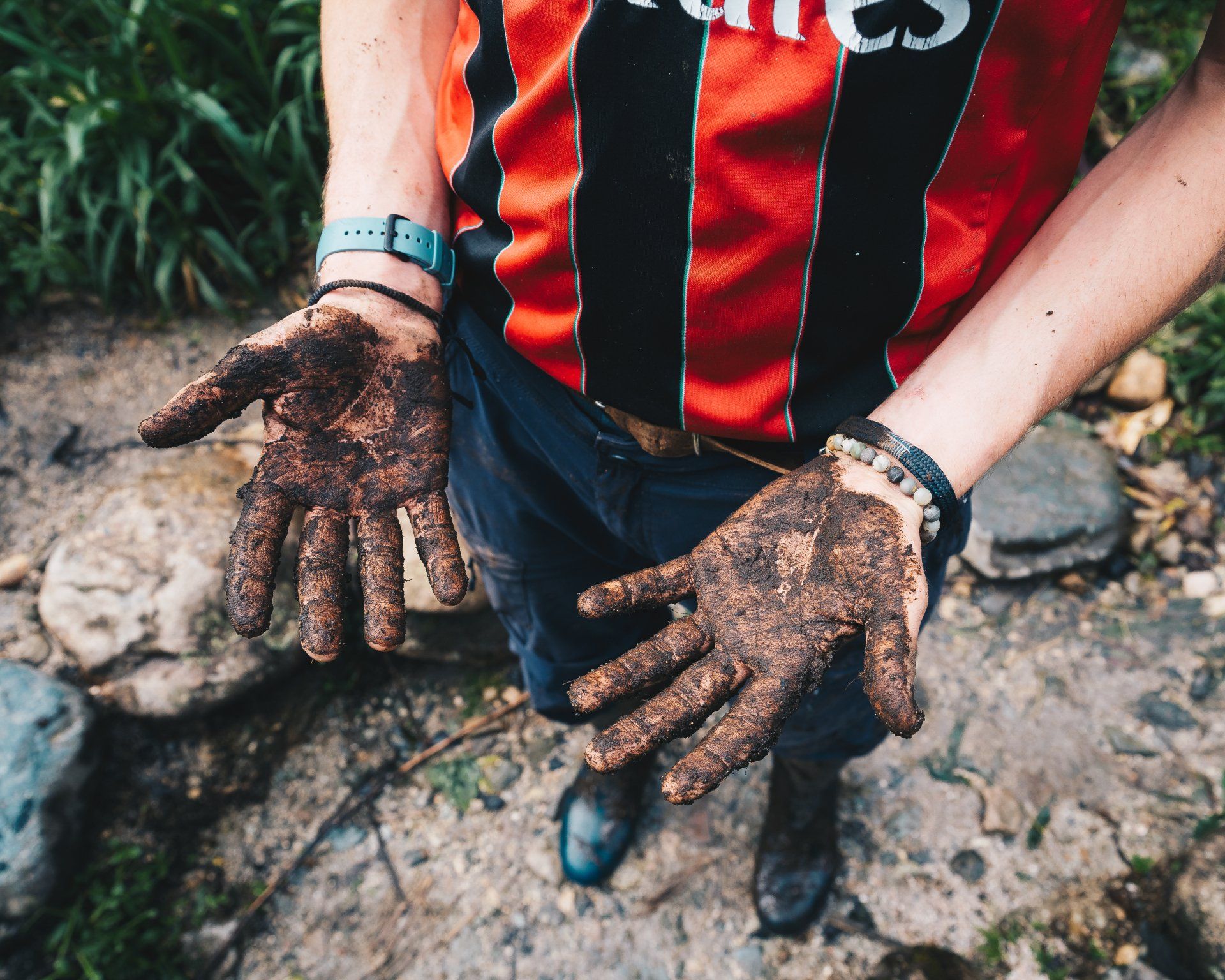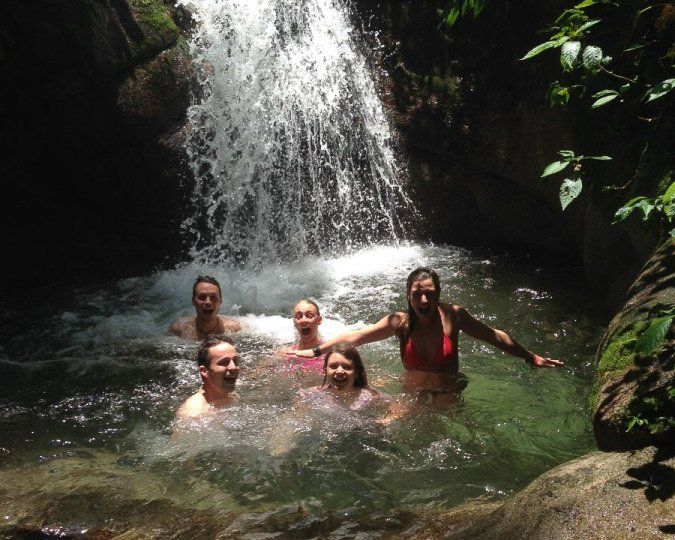FAQs
We hope you'll find the answers to your questions below but please feel welcome to reach out should there be something you can't find!
FAQs
We hope you'll find the answers to your questions below but please feel welcome to reach out should there be something you can't find!
-
What are the requirements?
In the meta sense: flexibility, a sense of humour, and a love for animals and the outdoors.
The minimum age requirement is 18.
The minimum time for volunteering is 3 weeks. People wanting to volunteer for longer than 3 weeks take preference. Staying longer will also make your own experience better.
You need to have a basic level of fitness, as most work is physical and walking up and down the jungle surroundings.
Knowledge of English and/or Spanish is required.
There are no requirements as to education and such, though we will try to take into account special interests and professional skills.
-
What are the costs and what do they include?
Merazonia does not receive any government funding and for the wellbeing of the animals, we do not receive tourists in the centre either.
Therefore we depend on volunteer fees to cover the basic costs of running the centre. The fees are as follows:
- $160 per week for weeks 1 to 3
- $140 for weeks for weeks 4 to 6
- $115 per week from week 7 onwards
These fees cover shared mixed lodging and food (excluding personal things such as toothpaste, additional snacks etc.), boots (up to EUR size 46), fresh sheets, blankets and hot showers. They also include a contribution to medical supplies and animal food.
Fees do not include transportation nor insurance.
-
What is Merazonia's policy towards animals?
As we focus on rehabilitation and release, Merazonia has a strict hands-off policy for most of its animals. It is very important to minimize any human interaction with the animals as this is the first vital step toward their return to the wild. Because of this policy, we succeed in releasing a high percentage of animals back into the wild.
Occasionally we have baby animals such as neonatal monkeys, who do need a surrogate figure before being introduced to existing groups. Although these babies are very cute, we are strictly against volunteers posting interaction pictures with the animals online as this can encourage the illegal pet trade - a problem Merazonia is working hard to combat.
Some animals will never be able to be released which means our focus for them is on making their lives as pleasant as possible with natural and spacious enclosures and plenty of life enrichment. And if they enjoy human interaction, such as our parrots Margarita and Carlos, volunteers can give it to them! But please remember, your photos can be extremely damaging when posted online.
-
What is a typical working day/week like?
Animal care is rewarding work but certainly not a picnic in the park.
Volunteers work five and a half days per week, alternating free days. We feed the animals three times per day and the feeding rounds take between 2 to 3 hours each.
In the morning, we gather at 7.30 a.m to prepare the animals’ food and then we divide into groups to clean different animal enclosures and feed the animals.
Around 10 a.m, we take an hour for breakfast and then get ready for the rest of the day. Some people will feed the parrots while others are on projects such as animal life enrichment or general park maintenance.
Lunch is around 1.30 p.m. We gather to feed the mammals again at 3 p.m, after which there is time to hang out with other volunteers, enjoy the scenery, swim at the waterfall or river, or relax in a hammock.
People make their own breakfast and lunch, but take turns in groups of preparing the communal dinner.
Sundays are so-called ‘lazy Sundays’ in which we feed the animals only once a day and do chores, but no other work is done, leaving plenty of time to relax or enjoy the surroundings.
If there are enough volunteers, we have an activity day once a week, alternating working together on a project in the centre or doing something fun or cultural in the centre or the area.
-
Does Merazonia accept long term volunteers?
The longer people stay, the smoother the centre runs. That is why our fees are lower when more time is spent at the centre.
Occasionally we have openings for long-term volunteers to help us with training new volunteers and the day-to-day running of the centre. People who we have worked with before, or have been here for a while, take priority.
-
What types of animals does Merazonia receive?
Currently, we house various species of monkeys (capuchins, woollies, howlers), kinkajous (nocturnal mammals), a puma (who receives a minimum of human attention) and other mammals (sloths, coatis and tayras). We also house many parrots.
We are a rescue and rehabilitation centre, so there are changes because of releases (yay!) or relocation of animals.
-
What are the living conditions like at Merazonia?
The accommodation is jungle based: we have a fully equipped kitchen (gas cookers, oven, fresh drinkable water) and hot showers. Merazonia is partly solar powered. This means you can keep small devices charged and enjoy lights in the volunteer house when the sun goes down.
Merazonia has a 3 floor volunteer house. We are currently transforming the house, so each dorm has a maximum of six volunteers. Sometimes, a space opens up in a cabin, these are usually offered to people that have been here the longest.
The closest internet access is in the town of Mera. Many volunteers buy an Ecuadorian Sim card that comes with internet data and access to WhatsApp.
We have dry compostable toilets.
There are lots of beautiful areas outside to relax after the hard work!
It is possible to do small quantities of laundry by hand on-site. We also offer the option of taking your washing to a launderette in Puyo where it is washed and dried for a fee.
-
What is the food like, and can you accommodate vegetarians/ vegans?
Usually, volunteers will cook their own breakfasts (porridge, eggs, toast, pancakes, fruit etc.), and make their own lunches as well (we usually have on-hand supplies for sandwiches, omelettes, pasta etc.). Volunteers take turns cooking communal dinners and cleaning up afterwards. Food is vegetarian and there is always a vegan option.
-
How do I get to Merazonia?
The closest international airport is in Quito. There are many hostels around the airport too.
The south bound bus terminal in Quito is called Quitumbe and about a 40 minute taxi ride out of city centre (about $10 to $15). Nowadays the centre of Quito is also connected to the bus terminal by Subway (Metro) for $0.45 - the airport is not connected to this). From Quitumbe, the town of Mera is a four and a half hour bus ride (about $8). Any bus towards Puyo or Macas passes by Mera. There is no bus terminal in Mera. You will have to get off the bus at Mera’s main square, bordering the main road to Puyo. From here, you can take a local taxi called Transmera, which will take you up to the entrance of Merazonia for $5. Transmeras go all day until roughly about 8 p.m.
Note that the sun sets around 6.30 p.m. here. If you are coming straight from Quito, we recommend leaving between 11 a.m. and 1 p.m. in order to get here during daylight hours. The San Francisco bus company has most frequent buses. Other companies include: Expreso Baños, Pelileo, Amazonas, among others. Alternatively, you can break up your trip in Baños at only one hour from Mera. Any bus from here towards the Amazon passes by Mera.
We prefer volunteers to arrive on Mondays and Thursdays, between 4 and 6 p.m.
-
What do I need to pack?
In the Amazon, the weather runs from brilliantly sunny to downright wet (it is the rainforest), so we recommend rain gear and clothes you can layer (and chocolate or liquorice if you really want to get in good with the managers).
Bring biodegradable soap, shampoo and conditioner.
We provide gum boots up to EUR size 46 (US 12-13) you will have to bring your own if that is too small.
We also provide second-hand working clothes as well as linen and warm blankets.
At the moment we have solar energy in certain areas and also provide candles. A flashlight or headlight is necessary for dark jungle nights (a red light option is needed when working with the night animals, such as kinkajous).
Volunteers recommend bringing extra socks, a good power bank and a waterproof watch.
If interested, we can send you a list of products that we can always use here such as medical supplies and (old) phones.
-
How do I make a reservation?
If you are sure you want to come volunteer with us, please fill out our volunteer application form here.
We ask for a $90 non-refundable deposit in order to confirm. This forms part of the volunteer fees for the first week and includes a snazzy Merazonia reusable laundry bag to reduce plastic waste. We will send you a link for this deposit once we have confirmed dates and answered your questions.
Only make a deposit once we have communicated that we have space for you for the date you inquired for.
You can give us the remaining volunteer fees when you are here. Volunteer fees are used for our shopping twice a week. We prefer to receive these in cash because we buy all our shopping in the local markets where they only accept cash.
-
Do I need vaccinations?
In general, the following vaccinations are recommended for Ecuador: Yellow Fever, Hepatitis A + B and Typhoid. Contact your local health office for more details or check online.
-
Is Merazonia in a malaria risk zone?
We are not located in a malarial zone.
-
Do I need rabies shots for Merazonia?
We do not recommend rabies shots as the risks are very slim. But feel free to do so if it makes you feel more secure.
-
Hospitals and general safety
Mera is located at a 30 minute drive from Puyo where there are several hospitals. There is also a health centre in Mera and an international medical centre in Shell (15 mins). Ecuador is a fairly safe country as long as you take normal precautions, such as travelling during daytime hours and keeping objects of value close. As anywhere in the world, crime is mostly concentrated in the big cities such as Quito and Guayaquil.
-
How many volunteers are there at Merazonia?
In general, we have between 8 to 15 volunteers at a time, with 2 to 4 coordinators present. To date, Merazonia is proud to have received the help of volunteers from: Ecuador, Argentina, Aruba, Australia, Austria, Belarus, Belgium, Bolivia, Brazil, Canada, Czech Republic, Chile, China, Colombia, Congo, Croatia, Denmark, El Salvador, England, Finland, France, Germany, Hungary, Iceland, Iran, Ireland, Italy, Israel, Japan, Kenya, Latvia, Lithuania, Luxembourg, The Netherlands, Morocco, Mexico, New Zealand, Norway, Panama, Peru, Poland, Portugal, Romania, Russia, Scotland, Slovenia, Slovakia, South Africa, South Korea, Spain, Sweden, Switzerland, Taiwan, Trinidad and Tobago, Turkey, The United States, Wales and Zimbabwe.
-
Where can I find more information?
Here on our website you will find more info on the project and the work. For recent updates, follow us on Facebook or Instagram. There are many blogs and reviews on the internet as well if you like to get more feedback. There is also a selection of videos on YouTube.
If you would like to apply you can use our Application form and for more information please contact info@merazonia.org






